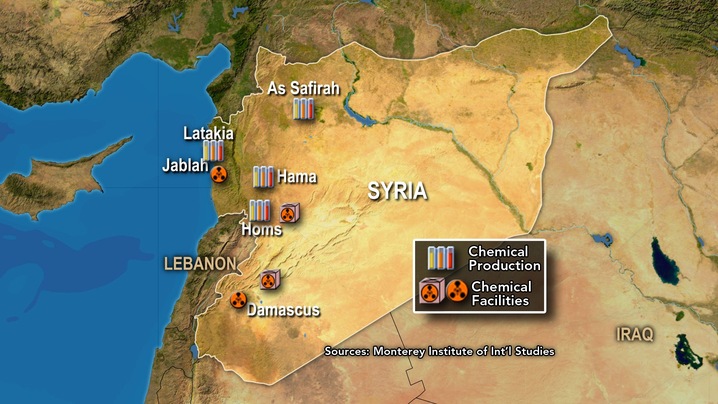
From the Economist: Western intelligence agencies have been monitoring Syria’s stockpile of chemical weapons and have been trying to work out what to do about them: Syria is the first country with weapons of mass destruction (WMD) to be ripped apart by civil war.
None of the options looks good. In the first place, Syria has an awful lot of the stuff, produced or stored at about 50 different sites scattered around the country. . . .
Western governments worry about a number of scenarios, all of which are, according to Emile Hokayem, a Bahrain-based analyst with the International Institute for Strategic Studies (IISS), “plausible but not probable”. The first is that Mr Assad’s government, despite its most recent announcement, will use chemical weapons in desperation against the insurgent Free Syrian Army or as a terror tactic against a city that it has lost. Neither is very likely. Militarily, shells and rockets with chemical warheads may be useful against dense force concentrations. But against dispersed irregular forces, they may well be more dangerous to those firing them. Raining nerve agent down on the civilian inhabitants of a city might disgust even the regime’s staunchest supporters.
A Scud-based attack on Israel would be even more counter-productive: the Scuds are not generally accurate and would probably do little serious damage. But even if they avoided Israel’s missile defences they would prompt a furious response. Of more concern is the possibility of chemical warheads being transferred to Hizbullah, the Shia party-cum-militia that dominates southern Lebanon. However, as Dina Esfandiary, a proliferation expert at the IISS in London, argues, Hizbullah, which increasingly wants to be seen as a state actor rather than a non-state one, would have little interest in acquiring them.
By far the biggest worry is that in the chaos engulfing Syria, some chemical weapons might fall into terrorist hands. Al-Qaeda has often said it would use WMD if it got hold of them, and it appears that Ayman al-Zawahiri, the organisation’s leader, has encouraged his sympathisers to join the Syrian opposition. Ms Esfandiary is far from dismissive of the danger, but is sceptical. Big volumes of chemicals are hard to transport invisibly, and trained people in protective gear are needed to mix the components into a deadly concoction. Firing a weapon at precisely the right angle for the canister to open up and spread its contents is hard, says Mr Hokayem. Biological weapons are even trickier to handle and lose effectiveness very quickly. That said, the psychological impact of an al-Qaeda WMD attack in the West would be devastating and the risk is big enough to do everything possible to prevent it.
Pre-emptive air strikes against Syria have been discussed. But they would almost certainly leave some of the material intact, and the chance of accidental dispersal would be high; many storage and production sites are near population centres. The CIA has been working with Jordan’s special forces. But without the right training and equipment to seize and neutralise stockpiles, their effectiveness might be limited to providing timely intelligence about where they were. Ms Esfandiary says the main efforts must be aimed at deterring Syria’s rulers from using their WMD (making it clear that they would be signing their own death warrant if they did), working with neighbouring states to stop leakage, and helping the rebels to prevent terrorist groups from exploiting their success. Mr Assad could also try to partition the country, taking his WMD with him. “That”, says Mr Hokayem, “could be a huge issue down the road.” (graphic: Monterey Institute for International Studies)
Image: monterrey%207%2027%2012%20Syrian_Chemical_Weapon_Sites.jpg
